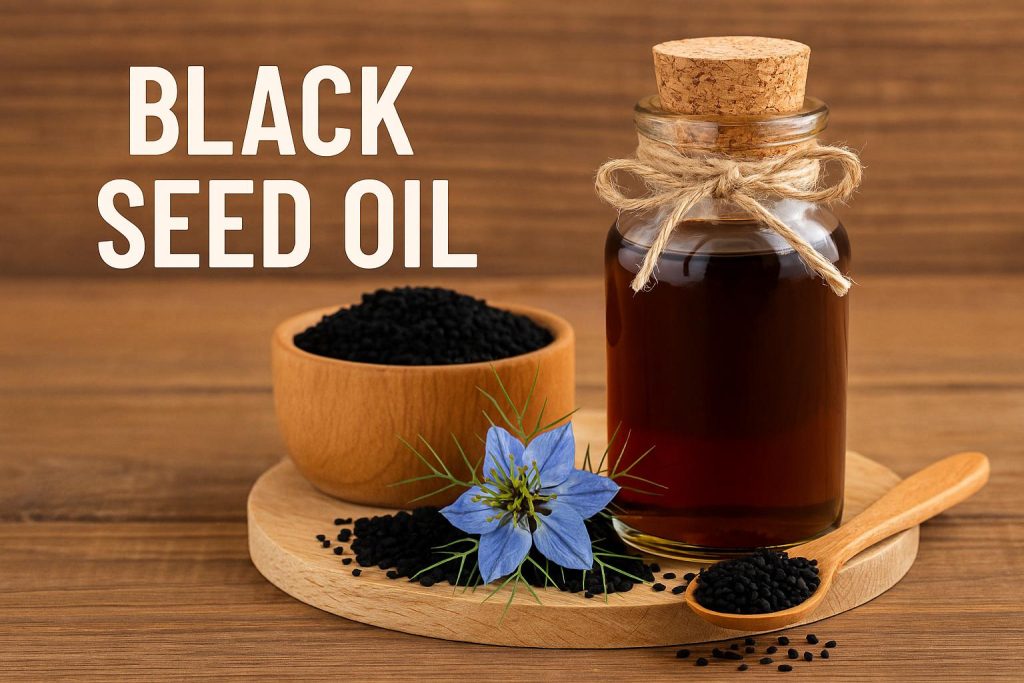
Overview of Black Seed Oil
Black seed oil is a well-known derivative from the seeds of the Nigella sativa plant, often called black cumin. This oil has a rich history in traditional medicine, particularly in regions like the Middle East, Africa, and Southern Asia. For centuries, it has been revered for its medicinal potential, and today, its popularity continues to grow globally among both consumers and researchers. The renewed interest in black seed oil is largely due to its purported health benefits, which range from supporting the immune system to enhancing skin and hair health.
Composition of Black Seed Oil
Black seed oil encompasses a myriad of bioactive compounds that are central to its perceived health benefits. Among these, thymoquinone stands out as the primary component, believed to offer significant therapeutic properties. In addition to thymoquinone, black seed oil contains thymohydroquinone and other antioxidant compounds that contribute to its health-related uses. The oil is enriched with essential fatty acids, vitamins such as E and K, and minerals including iron and zinc—all of which are vital for maintaining optimal health.
Potential Health Benefits
The exploration into black seed oil’s health benefits is diverse, outlining several areas where it could potentially contribute to well-being:
Anti-Inflammatory Effects
There is growing evidence that black seed oil possesses considerable anti-inflammatory properties. Inflammation is a fundamental biological response that, when chronic, can lead to numerous health issues such as arthritis and asthma. Black seed oil, through its active compounds, may help to mitigate inflammatory processes, offering a natural alternative for managing chronic inflammatory conditions.
Antioxidant Properties
One of the crucial roles of black seed oil lies in its antioxidant potential. Antioxidants are compounds that combat oxidative stress by neutralizing free radicals—unstable molecules that can cause cellular damage. This protective quality of black seed oil may help reduce the risk of developing chronic diseases associated with oxidative stress, such as heart disease and cancer, and support overall cellular health.
Immune System Support
Black seed oil is often associated with immune-boosting properties, which have been corroborated by various studies. The oil appears to enhance the body’s natural immune defenses, potentially by increasing the production of immune cells and optimizing the immune response, thus helping the body fend off infections and illnesses more effectively.
Digestive Health
In traditional medicine systems, black seed oil has often been utilized as a remedy for digestive ailments. Its anti-inflammatory effects may benefit the gastrointestinal tract, alleviating symptoms associated with digestive disorders. Anecdotal evidence suggests it can help in conditions like bloating and indigestion, promoting a more comfortable digestive experience.
Skin and Hair Benefits
Beyond its internal health applications, black seed oil has garnered acclaim in the beauty and cosmetics industry. The oil’s moisturizing, anti-inflammatory, and antimicrobial properties make it a valuable component in products aimed at improving skin hydration, reducing signs of acne, and enhancing hair health. Regular use of black seed oil, either directly or as an ingredient in skincare and hair care products, can lead to noticeable improvements in skin texture and hair shine and manageability.
Usage and Dosage
Black seed oil presents versatility in its application, being suitable for both oral consumption and topical use based on individual health goals. It is obtainable in several forms, including capsules, raw oil, and as an inclusion in various health and beauty formulations. Nevertheless, utmost care should be observed when determining the dosage. Users should adhere strictly to recommendations provided on product labels or seek guidance from a healthcare professional to ensure appropriate usage, thus minimizing the potential for adverse effects.
Considerations and Potential Side Effects
While black seed oil is generally regarded as safe, it is not devoid of potential concerns. Allergic reactions have been reported in some users; therefore, conducting a patch test before topical application is prudent. Certain populations, such as pregnant or breastfeeding women and individuals with specific health conditions, are advised to consult healthcare providers prior to incorporating black seed oil into their regimen. This precautionary measure ensures safety and prevents unintended interactions with other medications or health conditions.
Further Reading and Resources
For those interested in a comprehensive understanding of black seed oil and the breadth of its uses, consulting authoritative sources in herbal medicine and scientific literature is recommended. A deeper insight into current research and scientific perspectives on black seed oil can be obtained by exploring peer-reviewed articles and resources available on databases like PubMed. Accessing such resources can provide valuable information, offering both traditional insights and cutting-edge scientific findings to better appreciate the capabilities and applications of black seed oil.

